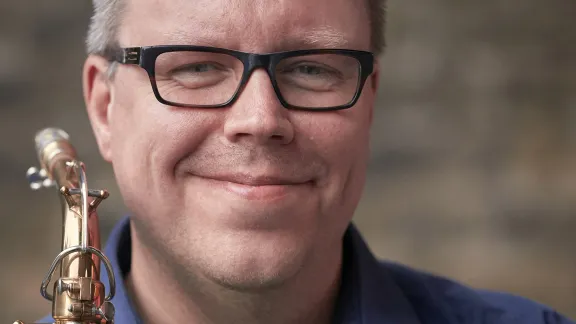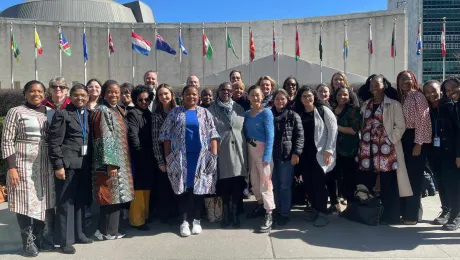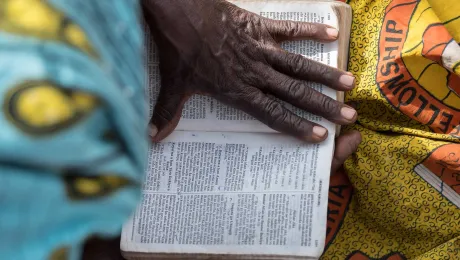Voices from the Communion: Uwe Steinmetz, jazz musician and composer

German musician and composer Uwe Steinmetz. Photo: Andreas Schoelzel
(LWI) – Music is “a holistic expression of faith,” says Dr. Uwe Steinmetz. He works internationally as a jazz musician and composer, and since 2015 also for the Liturgy Institute of the United Evangelical Lutheran Church of Germany (VELKD).
Steinmetz also contributes to the Lutheran Identities study process of The Lutheran World Federation (LWF) and is a member of the International Worship Planning Committee (IWPC) preparing for the Thirteenth Assembly in 2023.
In this interview, he speaks about the power of music, its influence on shaping Lutheran identities, and a project combining both.
Your focus in the LWF’s Lutheran Identities study process lies in liturgy and musical aspects of Lutheran identity, and you initiated a research project on global Lutheran music. Tell us about that project.
The project will only end in mid-2024. But I can already say that one of Martin Luther's most important insights – that “next to the Word of God, the noble art of music is the greatest treasure in the world” – rings true also today. Being Lutheran means that I can express my faith through singing and music. And this music can be a soundtrack of my spiritual life, an extension of prayer beyond words.
Music, in Lutheran congregations, is not limited to being an aspect of a worship service. It is a holistic expression of faith in everyday life and encompasses lament, joy, hope, and resistance to injustice and the longing for freedom. I can see this in my own country during the peaceful revolution of 1989 in the German Democratic Republic. Lutheran churches were catalysts for societal changes and created their specific soundtrack along the way. People needed new songs and old hymns to support the community spirit and help to proclaim hope in a secular environment beyond theological doctrine and religious vocabulary.
As I learn more from Lutherans in other parts of the world, I note that music is often seen as a compass for a society’s sensitivities, visions, and dreams. Therefore, the search for new songs that provide meaning from a Christian perspective is unbroken. Of course, this goes along with the rediscovery of traditional hymns and their timeless qualities in expressing a joint faith throughout centuries. We can frequently witness how hymns and spiritual songs from the 16th and 17th centuries become popular again in new arrangements and adaptations. For me, this is a particular Lutheran musical and liturgical quality: providing the space for a fruitful interplay between tradition and contemporary life in song and words that go beyond church walls and manifest in everyday life.
How will you share the findings of the project?
Through a collection of eight songs previously printed as pamphlets, Martin Luther's so-called Achtliederbuch of 1524 uniquely documented the Reformation movement. It is a snapshot of the Reformation ideas in the shape of songs.
Following this inspiration 500 years later, the project will conclude with publishing a “Global Achtliederbuch 2024”. It will be a mosaic of Christian expression in contemporary language and sound across cultures and churches in the seven LWF regions. The eighth instance is filled with today’s common historical heritage of Luther's hymns.
The book is, therefore, not a traditional hymnal. Instead, it gathers modern arrangements of traditional and new songs that address current topics of our age viewed from different cultural traditions. I have called the spectrum of these songs “of pilgrimage, freedom and belonging”, as these three aspects seem to be at the heart of the identity of Christians in the Lutheran tradition today. The website “Lutheran Rites and Hymns 2024” gives an impression of this project and will share some of the music in the coming months.
The contributors to this hymnbook are all engaged in Lutheran churches in the seven LWF regions. In addition, many write songs also widely known outside of churches, and I wanted to draw attention to this dimension. From a historical perspective, many spiritual songs or hymns became part of the general contemporary music world, beginning with Bach cantatas to spirituals, gospels and protest songs that had church roots – for example, the protest song “We shall overcome” in the USA.
How will the Thirteenth Assembly in Krakow benefit from this work?
I am very grateful to be part of the International Worship Planning Committee (IWPC) team that serves the Assembly by providing the music for worship – a wonderfully dedicated international group.
Some of the “Global Achtliederbuch 2024” songs will undoubtedly be sung at the Assembly as part of the joint services. However, the Assembly will also remind us as Lutherans that singing and listening to one another is at the heart of our religious practice when we come together. Engaging musically as a community has a unique quality for me: it is a natural extension of prayer and helps to provide transformational experiences of worship. So, the Assembly will be a cornerstone in underlining the importance of music in expressing the faith and life of the Lutheran communion and will also provide the final inspiration for the “Global Achtliederbuch 2024.”
What is the connection between jazz and blues and Lutheran liturgy for you on a personal level?
I grew up in Northern Germany and became a Christian in the Lutheran churches in India and North America during my studies there. I also had important liturgical experiences in Lutheran churches in Ethiopia, Brazil, and Northern and Eastern Europe.
In many of these contexts, I have experienced liturgies where jazz and blues had found a home for decades; church music actively sought a dialogue with the contemporary musical world. I felt welcomed. I was often invited to participate in those worship services – either with a band or an organist. It has encouraged me to seek connections between my musical practice and how I worship through music. I am convinced that liturgies should have an “integrative quality” welcoming contemporary songs and words. Looking back at Luther´s times, I think this could be a more significant feature of Lutheranism today – and it is well worth working for this.
Regarding my musical background: Jazz and blues as musical genres have become part of numerous world cultures. Ethiopian jazz sounds different from Japanese, Scandinavian, or New Orleans jazz. Nevertheless, jazz musicians feel united in our way of approaching music beyond cultural borders. For me personally, that can also be said about how I view the idea of global Lutheran identities: We all sound different, but we belong to the one body of Christ – harmony in diversity.
As a musician and composer, you have dedicated the decade from 2020 to 2030 to the beauty of nature. What is your hope for humanity, our world, and God’s creation?
As a minor part of the immense richness of creation, humans pose a significant threat to it. We are destroying our planet, and in doing so, we kill much of the inspiration and joy we need to be creative ourselves. I hope that we will reach increased awareness about this and that it will lead to a new spiritual awakening on a global scale that will ultimately foster new bonds between cultures and religions.
What does being part of the global Lutheran communion mean to you?
I am part of a global mosaic of people learning gracefully together and from each other to be a constructive part of God´s creation with their gifts in their local communities.
By LWF/A. Weyermüller
The Lutheran World Federation is a global body that shares the work and love of Christ in the world. In this series, we profile church leaders and staff as they discuss topical issues and set out ideas for building peace and justice in the world, ensuring the churches and communion grow in witness and strength.


